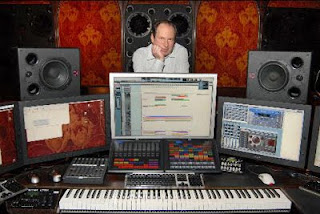 By Dan Parkes (Director)
By Dan Parkes (Director)While there is some very good production library material to choose from, absolutely nothing beats having a composer write music that is tailored to your film. Here are some reasons why:
1. Emotion
A favourite expression of mine is that 'music is shorthand in emotion.' While you have likely spent considerable time developing emotional arcs for your actors to perform, along emotionally dramatic story lines, it can actually take only one or two well selected notes of music to impart just as powerful an emotional impact. This subtle power of music to engage an audience emotionally by adding layers of depth to a scene should never be underestimated.
2. Themes/Characters
A tailor-made score can provide a unique theme for your film that can be used later in trailers and DVD menus. An identifiable main theme and minor themes for characters or plot points can help guide an audience on a journey through your story. The selection of a certain type of music or particular instrumentation can give your film an entirely different feel.
 3. Pace
3. PaceA score can help set and change the pace of the film -slower music for scenes that are gradually unfolding, faster music to quicken the pace for an action scene. While it may be easier to cut to library music, a composer can score it to match how it was filmed.
4. Cues
It is quite difficult if not impossible to use production library music for cues -for example dramatic cues that introduce surprise elements or that build for a reveal. A good composer can create cues for exact moments in the film, timed to fit precisely with the on-screen narrative.
5. Continuity
An underscore can also help create continuity, linking elements in a scene together which may otherwise seem disjointed.
6. Soundtrack album
With a strong tailored-made score for your film by a talented composer, you have the opportunity of also releasing a standalone soundtrack album.
There are many composers out there wanting an opportunity to show what they can do. However, there are some important things to look out for when finding an ideal composer for you film:
1. Film experience
What experience do they have writing music for an actual film? Being able to write a good piece of music is not a prerequisite for film scoring. Film soundtrack music is quite a different genre in its own right and a novice can often fall into common traps if lacking experience.
 2. Subtlety
2. SubtletySoundtrack music needs to accompany not dominate a film. There are times when there should be no music at all. Or the music should hint at rather than tell an audience what is happening.
3. Genre
Has the composer ever written the kind of music that you are wanting for your particular film? While a composer who has experience writing techno dance music may want to broaden their horizons with something orchestral, you are taking a great risk if this is going to be their first foray into the genre.
3. Reliability
A composer is often brought in during the final post-production stage and can often only begin work once a rough cut of the film is coming together. Make sure your composer is both available and reliable enough to ensure you hit your final deadlines.
4. Communication
If you do not understand musical terminology you will need to find an effective means of communication. It is most important that this communication is clear from the beginning, as there is nothing worse than having a composer spends hours creating a score that you then have the painful process of explaining is not at all what you were wanting....
In the next blog we will look at the process of writing music for screen and how it works within the film's overall workflow.





No comments:
Post a Comment